I meet Miriam Margolyes in her large Victorian house in Clapham. She is very small and round, with a shock of grey hair, and the clear and open gaze of a curious child. There is an innocence to her, like someone who has not quite grown up. She has a wonderful voice, which bought this house. When it rests it is low and serious; but when she is telling a good story it takes flight.
She is best known, now, for Harry Potter films and Blackadder; and for The Graham Norton Show which she dominates by speaking filth while looking delighted. This is deceptive though. When she wants, she can be very serious, although she struggles to be serious for long, which is why, I think, she does not have Janet Suzman’s career. When I say I find her serious she is delighted. ‘Most people who interview me don’t think that,’ she says. They think you are like a clown? ‘Yes.’
I watched Martin Scorsese’s The Age of Innocence the night before we met. She won the Bafta for playing Mrs Manson Mingott. She was, for me, the compassionate soul of a desolate film, in which her voice emanates from a frilly pile of flesh, failing to stall tragedy. It makes me long to watch her perform Shakespeare, but instead she is doing documentaries such as The Real Marigold Hotel with Stanley Johnson — ‘God, what a pillock.’ I am here to discuss Miriam’s Big Fat Adventure, in which she goes around talking to fat people about being fat. It was plaintive. I wasn’t hungry when I finished it.
It was a good subject, she says, ‘because I am fat, I’ve always been fat and you’re not supposed to be fat, so my built-in rebellion starts with the very flesh that I inhabit.’ I jump on this: did she overeat to upset her mother? I overeat to upset my mother. ‘It did upset my mother, but she was fat, and it did upset me. So, it was a war between us on food.’ When her mother ate too many potatoes, Miriam ran into the street crying.
This is my introduction to Ruth, a woman who so dominated their household — Miriam clearly learned stardom from her — that I forget to even ask her father’s name. I had to look it up. It is Joseph Margolyes and he was a Jewish doctor.
They met in London at a Jewish tennis club and fled from London to Oxford in the Blitz. They chose Oxford because they needed to get the car repaired and since Hitler wanted to make Oxford his capital, it was unlikely to be bombed — so why make two journeys? Miriam was conceived during an air raid. ‘For 11 years they must have had intercourse but never complete[ly], but in the air raid, in the heat of the terror, I was created,’ she says. It is no coincidence that it sounds like the birth of a god.
She was her mother’s creation. Ruth was ‘ebullient, daring, full of life, humour, brave’. She was conscious of her lack of education and wanted Miriam to be ‘with the best people’.
It was a contradiction, though; Ruth also believed that the world was hostile. She told Miriam not to speak about the family beyond the family. She said: ‘Be contained.’ And so, Miriam says, ‘I am the least contained person.’ She had to ‘tell Mummy everything. Mummy made that quite clear. And it was wonderful.’ Ruth told Miriam everything too, including things she should not have told her: that she tried to abort her (because a cousin died in childbirth) but the doctor wouldn’t allow it. I gawp at this.
But she knew she was the love of her mother’s life. ‘She adored me and spoilt me and wanted everything for me.’ And, because of this, ‘I was a very confident little girl and I have remained a confident little girl because I was sure that I would be loved.’ She tilts her head at me. ‘I expected it.’
This is confirmed by Ferdinand Mount’s memoir Cold Cream. Ruth was his landlord when he studied at Oxford. He remembers Miriam ‘lying on the hearthrug, an opulent tangle of dark curls and puppy fat. “I’m going to be an artist’s model,” she told us. “I’m going to pose for Augustus John. I’ve written to him and he says he’s very interested”.’ John died before he could paint her, but she went up to Newnham College, Cambridge, to read English. Her parents were ecstatic. They visited so often people asked if they were keeping terms.
She performed in the Footlights Revue of 1962 but John Cleese and Eric Idle, later the least talented of the Pythons, wouldn’t speak to her. ‘They just thought I was a pushy little Jew… They were all minor public schoolboys and they were intensely competitive, and I was funny, and they didn’t like it.’
Otherwise, she adored Cambridge. She spent time with the Leavises and did Long Day’s Journey into Night. Then she did rep and became a lesbian in 1966 ‘in Leicester. I always remember it because it was the year of the World Cup.’ The woman dropped her and took up with someone else. The expectation of adoration was thwarted, and Miriam ‘sort of beat them up and was fired for violence’. She plays out the scene for me.
Setting: Phoenix Theatre, Leicester, 1966.
Director (frightened): ‘I don’t think we have anything for you next season.’
Miriam Margolyes (stunned): ‘Nothing?’
Then came the day she told Ruth something Ruth didn’t want to hear: that she was gay.
This ‘crushed’ Ruth. She had a stroke and was felled — here Miriam sounds desolate — ‘like a great tree’. Miriam thinks it was her fault, but her friends say it isn’t. Even so, ‘She was the person I loved most in the world and I damaged her.’ But it was OK to tell you she wanted to abort you, I think, but can’t bring myself to say it because I like Miriam and the myths she weaves around herself. Instead I say that perhaps Ruth was unkind?
She can’t see it: ‘It made her unhappy and she gave her whole life to make me happy.’ This is not, in Jewish families, a strange declaration: mothers routinely say they will die for you but find it much more difficult to listen to you. Frankly, it’s normal.
It was, she says now, obviously not healthy that Ruth lived through her, and this is why, she thinks, she didn’t want children. Children love her work, but she isn’t very interested in children. She is, after all, an only child.
That year she fell in love with an Australian academic who is ‘sceptical’ and ‘contained’ — all the things she isn’t. The relationship initially faltered due to Miriam’s ‘very powerful sex drive. I remember in synagogue all I ever thought about was fucking.’ It derailed her for a time; perhaps that is one reason she did not have the Shakespearian career: too much shagging, and it doesn’t pay so well. But she recovered. She thinks she needed to be reminded she was desirable. They are still together.
One thing makes her grave and serious: her exile from the mainstream Jewish community because she is an anti-Zionist: ‘I am persona non grata in north London.’ She gives her exile a food-related theme, to emphasise her Jewishness: ‘the home of chopped liver. I love chopped liver and it’s very painful.’ Maureen Lipman, she says, is no longer her friend.
She obviously feels the loss, though I have met Lipman in her pomp and I wouldn’t. Her first question to me that morning was: are you Jewish? Her home is full of Jewish art and Jewish books; there is a mezuzah on her doorpost; she is planning a trip to synagogue to say prayers for her father. I have been angered by some Jewish anti-Zionists, but I can’t be angry with Miriam. She is so guileless. She is obviously a devoted, if not devout, Jew. It is, I judge, perfectly respectable to be an anti-Zionist Jew in a large Victorian house in south London. She is Professor Sprout and Lady Whiteadder. She is Aunt Sponge and the voice of the Caramel Bunny. I cannot discuss the criminality of the Occupation with the Caramel Bunny. I don’t want to.
It is lunchtime, so we go to a Thai restaurant she has become addicted to. She loves the food, holds the bowl close to her mouth as if she fears losing any part of it. She ponders if her weight has impacted on her career: ‘Yes, because I will never be given romantic roles because people don’t want to think that there’s anything below the waist with a fat person. Cunts and cocks of fat people are out of bounds.’ We discuss her appearances on The Graham Norton Show and the reason for her success. It’s an old trick, she points out, for a hoofer: ‘Anybody who says “cunt” and “fuck”’ — she throws these out — ‘several times is bound to be a star. It makes you suddenly relevant in some way.’ And she enjoys it. ‘I feel compelled to be disgraceful.’
I am sure this is both her rebellion against Ruth, and her tribute to her. Either way, she is always noticed; if you can’t be accepted, why not be noticed? ‘Mummy always called me the Star of Oxford,’ she says, giving ‘star’ a defiant ripple. Then she adds, sardonically, ‘There have been other stars of Oxford. It’s the sort of thing that gives you confidence when you are a little girl.’
I wonder if this confidence ever faltered when it collided with reality. I remember, for instance, the ‘sort of violence’ she inflicted on the lesbians in Leicester when one of them abandoned her. But she says not: who could undo the dark magic of Ruth’s love?
To demonstrate, she acts out an audition she once did at the Leeds Playhouse in which she was ‘dreadful’. Afterwards, the director asked her: ‘Are you absolutely set on a stage career?’ She looks amused. ‘I said, “Absolutely”. And I thought to myself, “Poor chap. He can’t see the talent. He just can’t see it.”’ She is fully committed to this story now, so she goes on: ‘I was crestfallen for a moment, then I thought’ — and she whispers, but there is laughter below it — ‘poor fella. He can’t see the talent.’
Got something to add? Join the discussion and comment below.
Get 10 issues for just $10
Subscribe to The Spectator Australia today for the next 10 magazine issues, plus full online access, for just $10.
Miriam’s Big Fat Adventure starts on BBC Two on 9 March.
You might disagree with half of it, but you’ll enjoy reading all of it. Try your first month for free, then just $2 a week for the remainder of your first year.


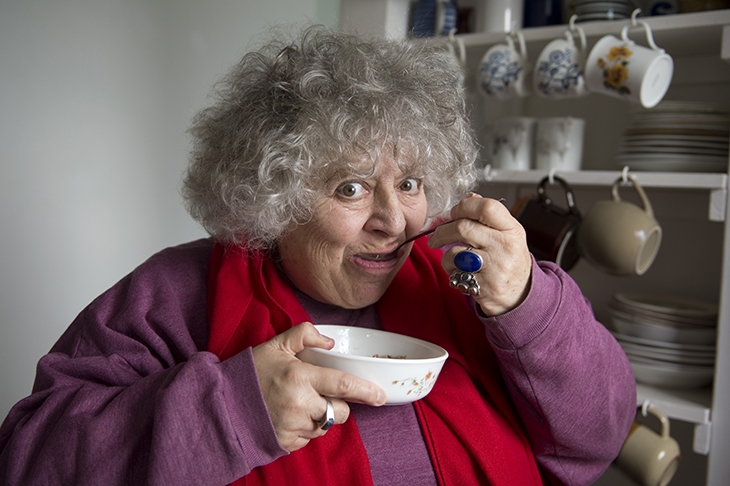
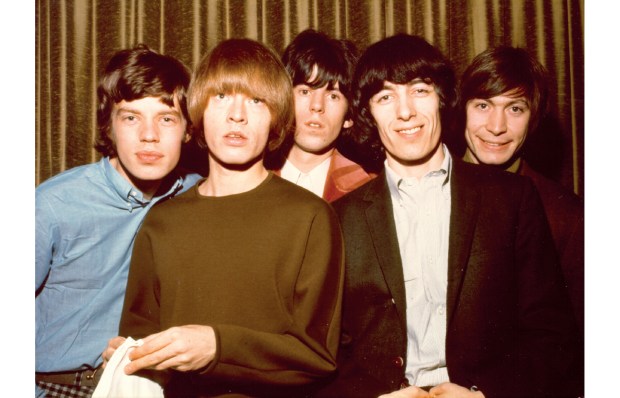
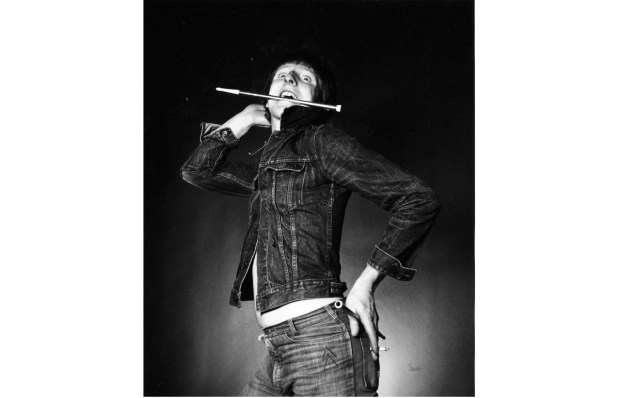
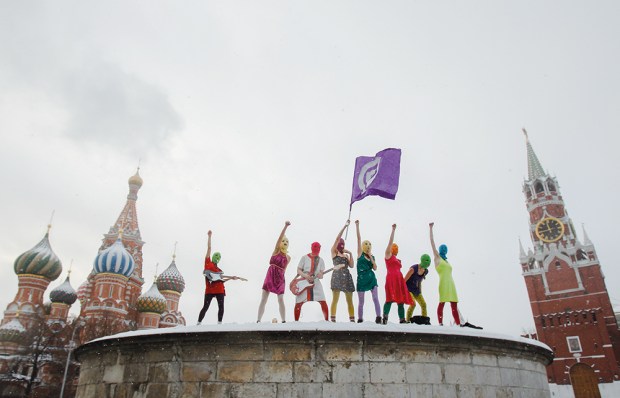

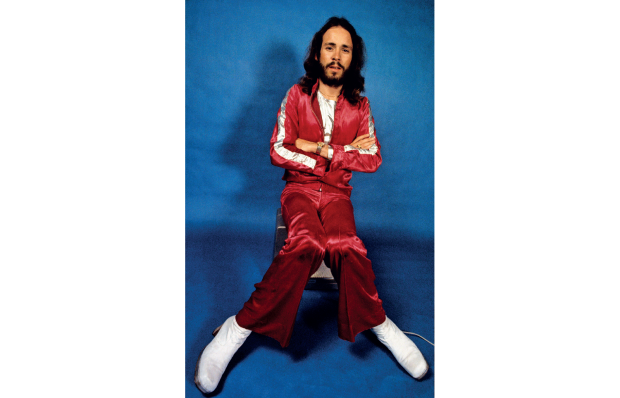







Comments
Don't miss out
Join the conversation with other Spectator Australia readers. Subscribe to leave a comment.
SUBSCRIBEAlready a subscriber? Log in